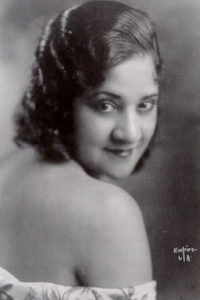
Evelyn Preer
Evelyn Preer was born on this date in 1896. She was a Black actress and singer.
She was the oldest of three children born to Frank and Blanche Jarvis in Vicksburg, Mississippi. When her father died, she, her siblings, and her mother migrated to Chicago, where she completed her grammar and high school education. Vaudeville provided her early training as a performer and "street preaching” for her Apostolic mother, who was trying to help raise funds to build an Apostolic Church for Blacks.
In 1918, Preer began her professional association with Oscar Micheaux, the first Black producer-director of films. One year later, she co-starred with Charles D. Lucas and Iris Hall in Micheaux’s debut effort, "The Homesteader." Micheaux promoted her as his premier leading lady with personal appearance tours and star-making publicity. In the second Micheaux film, "Within Our Gates" (1920), Preer starred as Sylvia Landry, a dedicated Black schoolteacher who meets and appeals to a wealthy Boston socialite to save a Southern Black school from closure.
"Within Our Gates" was Micheaux's answer to "Birth of a Nation." He inserted a seldom-viewed portrait of a wealthy white landowner who attempts to rape Preer's character. He later learns that she is his illegitimate daughter by Sylvia's mother, whom he had raped. Preer’s later Micheaux films include “The Brute” (1920), “The Gunsaulus Mystery” (1921), “Deceit” (1923), “Birthright” (1924), “The Devil’s Disciple” (1925), “The Conjure Woman” (1926), and “The Spider’s Web” (1926). “Within Our Gates” is the only movie of Preer's with Micheaux.
During this time (1920), Preer joined The Lafayette Players, the first professional Black theatrical stock company, which remained in existence for some time. Founded in 1915 by stage and film actress Anita Bush, it did not cease performing until Preer's death in l932. In Chicago, Preer met her future husband, fellow Lafayette Player Edward Thompson, and they later married in Nashville in 1924 while on a Southern tour.
In between Micheaux's films, Preer starred in many Lafayette productions. Along with the staging of Shakespearean and Broadway legitimate dramas, never staged before or after the Lafayette Players by a Black company, she starred in such mainstream classics as Oscar Wilde’s “Salomé” (widely lauded by critics as well as other actors and writers, notably award-winning, Theodore Dreiser. 1923), “Within the Law,” “The Yellow Ticket,” “The Cat and the Canary,” and “Anna Christie.” Also, in 1926, she had a successful stint on Broadway in the famous director-producer David Belasco's production of “Lulu Belle.” Preer won further acclaim as Sadie Thompson in a revival on the West Coast of Somerset Maugham’s “Rain” in 1928. She also squeezed some musical comedy and cabaret into her repertoire.
Preer also recorded (backup vocals) with Duke Ellington and Red Nichols. In the late 1920s, Preer reportedly appeared in unaccredited roles in several films at Paramount. At the Al Christie studios, she worked in three comedy shorts: “The Framing of the Shrew” (1928), “Melancholy Dame” (1928), and “Oft in the Silly Night” (1928). Although contracted for five movies, Preer broke her contract after a heated dispute with the producers and director, who insisted that she wear "Black face makeup."
In April 1932, Preer gave birth to her only child, Edeve (now Sister Francesca Thompson, OSF). She then developed pneumonia, a recurring health problem that had plagued all of her immediate family members, and she died of double pneumonia in November of the same year. Her understudy and supporting actress, Edith Spencer, moved up to her star position in the other movies still to be filmed.
Had Evelyn Preer not died prematurely in 1932, she might have been the much-needed Black “crossover” leading lady and icon on Broadway and Hollywood. Given the racial climate and restrictions on Black actors, the light-complexioned Evelyn Preer still emerged as a pioneer Black female performer in race film and dramatic theater. Headlines in the country's leading Black newspapers identified and noted her as “The Race's Premier Dramatic Actress."
Slow Fade to Black:
The Negro in American Film, 1900-1942,
by Thomas Cripps,
Oxford University Press, 1977,
New York, N.Y.